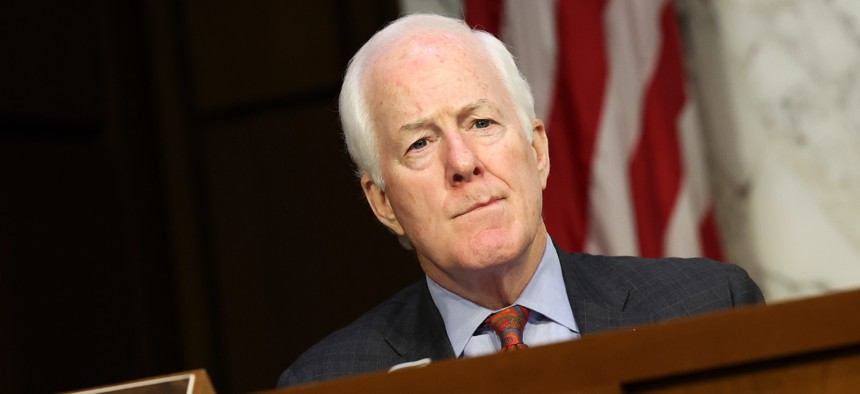Senators float plan to authorize local-level federal executive boards

Sen. John Cornyn (R-Texas), shown at a committee hearing, is co-sponsoring bipartisan legislation to authorize federal executive boards. Kevin Dietsch/Getty Images
The bipartisan Improving Government Efficiency and Workforce Development through Federal Executive Boards Act is designed to strengthen the workforce development activities of the boards.
Sens. Gary Peters (D-Mich.), chair of the Senate Homeland Security and Governmental Affairs Committee, John Cornyn (R-Texas) and Alex Padilla (D-Calif.) have introduced a new bill they say would improve collaboration between federal government offices outside the capital by authorizing existing federal executive boards meant to do just that.
These federal executive boards were created by a presidential directive in the 1960s, but aren't currently authorized by Congress, meaning their funding isn't stable. Currently, administrative funding for each board comes from "a voluntary host department or agency, while project funding is covered by local member agencies," according to a government website about the boards.
There are 28 locations across the country in places with high concentrations of agencies and federal employees. The boards "provide a forum for local federal leaders to share management challenges and strategies to meet agency missions and goals, identify common issues, develop collaborative efforts to address those issues, and share best practices among their peers," the website says.
What each board focuses on specifically varies depending on local needs, although they generally work on issues in emergency preparation, workforce development and intergovernmental and community initiatives.
The Improving Government Efficiency and Workforce Development through Federal Executive Boards Act is designed to strengthen the workforce development activities of the boards, like recruiting people into internships and apprenticeships.
In addition to authorizing the boards, the bill would establish an interagency fund for their operations, as well as require administration and oversight from the Office of Personnel Management, Office of Management and Budget and General Services Administration.
"Improving coordination between federal agencies is a vital step we can take to maximize the impact of government programs," said Cornyn in a statement. "This bill would ensure that federal employees have what they need to collaborate across agencies and partner with local entities to respond to the unique needs of their regions."
Max Stier, president and CEO of the nonprofit Partnership for Public Service, said the boards "have been at the core of supporting federal employees across the country."
NEXT STORY: GSA’s Login.gov has a new director



